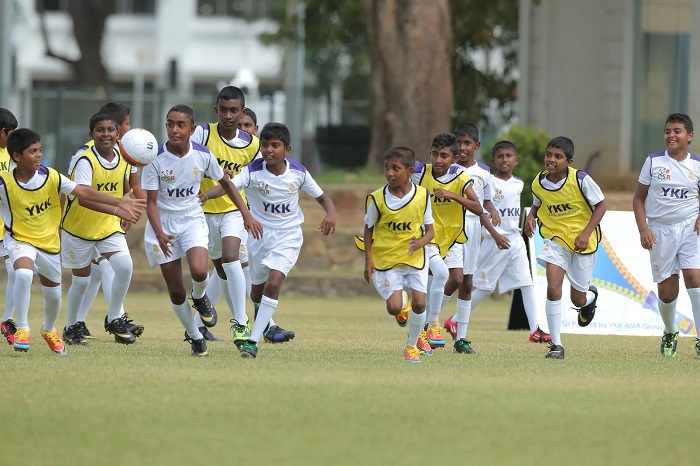
By Suhas Jayalath
Sri Lanka has a growing but relatively small football culture. Widely considered the world’s most famous sport, football has faced its share of challenges in Sri Lanka.
The history of Sri Lankan football traces back to the 20th century. Officially it was inaugurated and encouraged by British service members from the Royal Air Force, Royal Navy, Royal Engineers, Royal Artillery, and Royal Garrison Command. It was carried to the Central, Southern, and Up-Country regions by the British administrative service and the plantations. The early 1900s saw substantial growth in the popularity of competitive football among the youth in the area.
Even though Sri Lanka is yet to widen its presence at the FIFA World Cup, the country has been a member of FIFA since 1952. After becoming a member of FIFA Sri Lanka got the opportunity to play football at the international level. The country’s first International friendly was played against India. The Football Federation organized a tournament called Colombo Cup, which assisted the national team to increase their skills and compete with other nations.
Sri Lanka does not have a widely recognized or globally renowned football culture like other countries. However, it does have a dedicated following in Sri Lanka, chiefly among passionate fans and local communities. Local leagues and tournaments, such as the Red Stripe Premier League, have their own fan bases and contribute to the football culture within the country.
However, the onetime South Asian Champions are going through a rough patch. On January 21, 2023, FIFA announced the suspension of Sri Lanka’s membership in the body. The reason cited for this decision was political interference on the part of Sri Lankan officials. The suspension prevents the country from taking part in international competitions until the decision is reversed. In addition, no member or official of the federation can benefit from FIFA development programs, courses, or training.
However, with a strategic and determined approach it is possible to revive football in Sri Lanka. In this article we will explore some steps that can be taken to overcome the football ban in Sri Lanka and to develop the sport furthermore.
Underlying issues
It is crucial to address the underlying issues that led to the football ban, in order to lift it. As addressed by FIFA the lifting of the suspension will be subject to the following conditions being satisfied.
- Official and written exemption from the current national sports law to be legally granted to the FFSL/Sri Lankan football to guarantee the recognition and implementation of the newly adopted FFSL Statutes (September 22, 2022).
- The FFSL administration to be fully in charge of the FFSL’s daily affairs until a new FFSL Executive Committee is selected because the elections of January 14, 2023, are not recognized by either FIFA or the AFC.
- Elections for a new FFSL Executive Committee to be organized as per the newly adopted FFSL Statutes (September 22, 2022), especially by secret ballot and for a four-year mandate.
Encouraging sponsorships and investments
Football involves a lot of money. FIFA’s recent Annual Report shows a record-breaking revenue of USD 7.6 billion in the 2019-22 cycle and USD 11 billion is expected to be earned during the 2023-26 period. In other words, if you are looking to invest your money somewhere, Sri Lankan football might be the ideal place for you. Engaging with businesses and showcasing the potential of football as a marketing and a branding platform can create win-win partnerships, also creating an environment for foreign investors can provide much-needed resources for development.
Nurturing young talent
Nurturing young talent is essential for long-term development in Sri Lankan football. In Europe football academies do not charge any money for training for youngsters, they simply see it as an investment. Therefore, they train the players and sell them to big clubs when they come of age. In the US, they charge money for football practices, so only a limited number of kids can play the sport. That is why we see a huge difference between Europe and the USA when it comes to football. Europe has a better system in place and therefore has better players. Establishing such football academies in Sri Lanka can help identify and train promising players from a young age.
Enhancing coaching and technical development
In order to raise the level of football in Sri Lanka there needs to be proper guidance from coaches, therefore investing in coaching education and technical development is crucial. Teaching coaches on using technology for data analysis can play a huge part in the development of the sport. Collaborating with international football associations can bring in valuable expertise and guidance.
Fostering public interest and support
Raising public interest and support for football is vital. Putting together high-quality competitions, promoting local football clubs, and attracting fans through social media and other platforms can assist with making an energetic and faithful fan base. The promotion of football in Sri Lanka may also benefit significantly from partnerships with media outlets.
Collaboration and exposure on a global scale
Training camps and friendly matches can be made possible by collaborating with foreign football clubs and associations. Partaking in international contests, friendlies, and competitions can uncover Sri Lankan players to more significant levels of competition, working on their abilities and raising the profile of football in Sri Lanka.
Overcoming the football ban in Sri Lanka requires a multifaceted approach that addresses governance issues, attracts financial support, focuses on grassroots development, strengthens coaching and technical development, fosters public interest, and seeks international collaboration.
By implementing these steps Sri Lanka can overcome the ban and rejuvenate football. The hope is that with increased investment and support, Sri Lanka can be more competitive on the international stage and create a vibrant football culture within the country.
Suhas Jayalath did his A Levels last February. Presently he’s doing a CIMA course at Wisdom Business Academy. He hopes to study Computer Science, and harbors a passion for football, cricket, and Formula 1. He can be reached at suhasjayalath@gmail.com.
Factum is an Asia Pacific-focused think tank on International Relations, Tech Cooperation and Strategic Communications accessible via www.factum.lk.
The views expressed here are the author’s own and do not necessarily reflect the organization’s.


